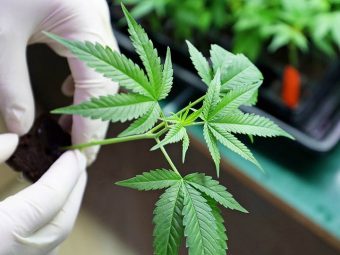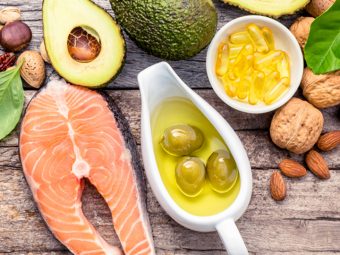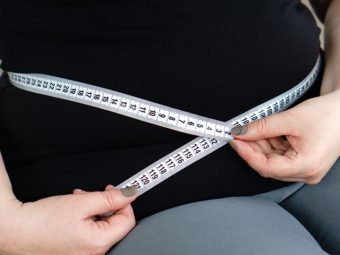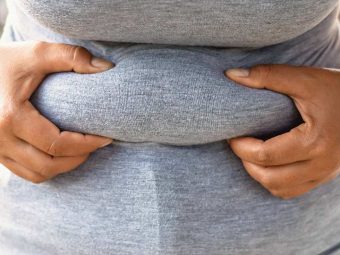What Are The Reasons For Weight Gain After Surgery? Ways To Lose Weight
From stress to food habits - learn what’s causing that post-surgery weight gain.
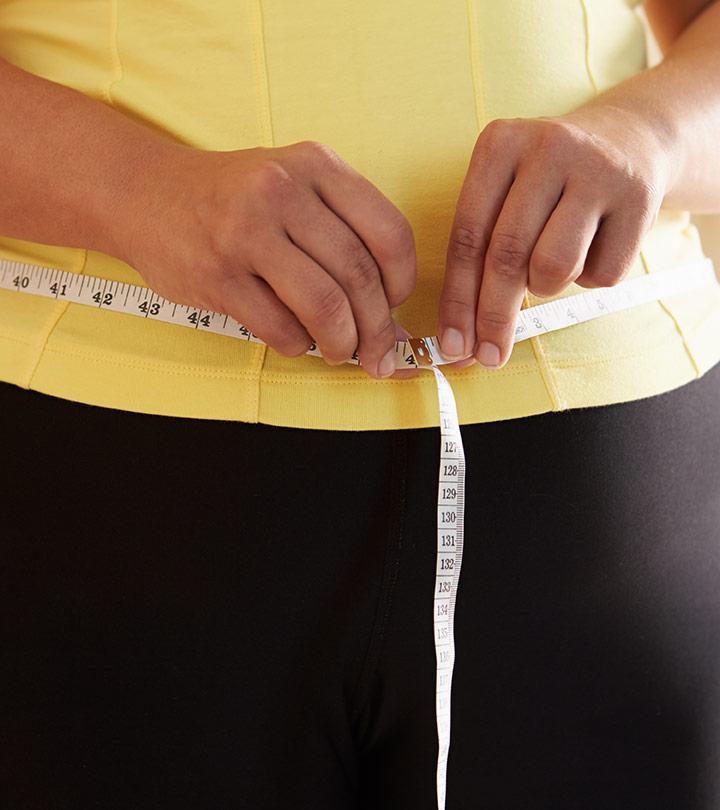
If you are gaining weight rapidly, one of the major reasons for it could be your recent surgery. This is due to the fluid retention that happens in the follow-up period. Weight gain after surgery can be handled by following a few measures.
Weight gain is commonly observed post-pregnancy, especially after undergoing a C-section. To put things in perspective, here is a staggering stat for you. The Pregnancy Risk Assessment Monitoring System (PRAMS) suggests that weight gain post-pregnancy has sharply risen by 70% over the last few years (1).
Even a small procedure like a tonsillectomy can make you put on weight. In this article, we have listed the six major reasons for postoperative weight gain and some dietary measures you can follow to shed those extra pounds you gained. Take a look!
In This Article
What Causes Weight Gain After Surgery?
Do not panic if your weight increases after surgery. You just need to figure out the exact reason and work on it.
1. Water Retention
Water retention is medically known as postoperative edema. It is one of the major causes of weight gain after surgery (2).
Edema is the fluid accumulation between the tissues caused by the redistribution of plasma proteins. Post-surgery tissue injury results in massive shifts of fluids in between body compartments, leading to the accumulation of fluid in the interstitial space, i.e., the space between the organs in your body (3).
This fluid retention can be localized in the extremities, or it can be generalized, giving you an overall plumper appearance.
2. Stress
Both physical and psychological stress can trigger hormonal imbalance, which can cause weight gain. Stress for prolonged periods burdens the adrenal glands and causes them to secrete more of the cortisol hormone (4).
A study conducted on people who underwent cardiac surgery found that surgery-related stress increases both cortisol and antidiuretic hormone (ADH) secretion (5). Increased ADH levels may disturb the kidney functioning and cause water retention.
3. Trauma
Surgical trauma often leads to metabolic, immunological, and endocrine changes (6).
Trauma is a bodily response to distressing or disturbing events. Post-surgery trauma often disturbs the body’s equilibrium and creates a hormonal imbalance. This leads to the malfunctioning of the hypothalamic-pituitary-adrenal axis, which further stresses the body (7).
A long-term observational study found that women with PTSD (post-traumatic stress disorder) tend to gain more weight and are at a higher risk of becoming overweight or obese (8).
4. Medication
Doctors often prescribe medication for post-surgery recovery. Most of these drugs are supplements to help regain your strength and promote faster healing. They may also prescribe certain medicines that affect your metabolic system and lead to weight gain (9).
5. Rest
Post-surgery recovery demands ample rest. Low activity and complete rest can slow down the body’s basal metabolic rate (BMR), which may result in weight gain.
Energy expenditure is directly related to your BMR and activity level. Low physical activity after a surgery can lower the BMR and calorie expenditure, which leads to weight gain (10). Doctors always suggest starting with slow physical activity after the recovery phase to revamp your body’s metabolic system.
6. Comfort Food
Who doesn’t want to indulge in comfort food? Besides, your loved ones may want to pamper you with all your favorite foods after your surgery. However, these comfort foods may make you gain weight.
Post-surgery blues often increase overindulgence in comfort food, particularly high-sugar and high-fat foods. This, coupled with your already slow metabolism, can make you feel bloated.
Now that you have zeroed in on the cause of your post-surgery weight gain, let’s check out some precautions that you can take to minimize it.
Precautions To Take To Minimize Post-Surgery Weight Gain
We know that we tend to gain weight after surgery (especially in the recovery stage). While gaining 5 to 6 pounds is normal, anything beyond that could lead to long-term issues. The following precautions can prevent this from happening:
- Start to move around a bit. You don’t need to rush to the gym immediately after your surgery. Just keep yourself active by moving around as it helps revamp your metabolic system.
- Practice some stretching exercises for better blood circulation. You can rotate your ankles or feet in clockwise and anticlockwise directions to prevent edema in the lower extremities.
- You can pamper yourself with your favorite food once a week, but do not overindulge in it.
- Include herbs like horsetail, parsley, cumin, and hibiscus in your food. They are natural diuretics that can help reduce water retention (11), (12), (13).
In addition to these precautions, you can also make certain dietary changes that can help prevent weight gain due to surgery.
Dietary Changes To Lose Weight After Surgery
1. Focus On Lean Protein
Protein plays a key role in the recovery process. It helps repair and heal tissue damage, boosts immunity, and maintains a good metabolic rate (14).
Always focus on including good-quality protein in each meal. To avoid gaining weight, consume lean protein with low-fat content.
Include skinless white meat, lean cuts of beef or pork, eggs, fish, plant proteins like pulses, beans, legumes, and low-fat dairy products in your diet.
Try healthy cooking methods like steaming and add protein to your salads.
2. Eat More Vegetables And Fruits
Vegetables and fruits are loaded with water and fiber that can help prevent excessive weight gain. Women often complain of developing belly fat after undergoing C-section. This was proven by a study conducted on mice (15). Hence, consuming more soluble fiber can help in this regard.
Moreover, vegetables and fruits are natural diuretics that can help drain out excess water from the body. Include cucumber, watermelon, lemon, asparagus, dandelion leaves, and nettle leaves in your diet. Spinach, broccoli, cabbage, cauliflower, tomatoes, pepper, mushrooms, aubergines, and other green leafy vegetables are also great choices.
However, we suggest you speak to your doctor/nutritionist before making these changes to your diet. Make sure to inform them about any medication you are taking.
3. Keep Yourself Hydrated
A study conducted on girls who were overweight found that drinking plenty of water improves your metabolic rate and digestion (16).
Adequate water intake prevents excess fluid retention by sending a signal to the kidneys to stop conserving water. But if you have any serious kidney issues, please consult your doctor before increasing your water intake.
Do not worry about weight gain after surgery. It happens as a result of medications prescribed for faster recovery, water retention, stress, or overindulgence in food post-surgery to keep the blues at bay. Following a few preventative measures can keep you from putting on those extra pounds. Remember, it is normal to gain a few pounds during post-surgery rehabilitation. All you need to do is follow a healthy and balanced diet, reduce your stress levels, and drink plenty of water. Consult your healthcare provider in case this unwanted weight persists even after following these tips.
Frequently Asked Questions
Does postoperative swelling cause weight gain?
Postoperative swelling is caused by water retention, which can lead to weight gain in the recovery phase. Eating balanced meals and a bit of exercise can help you overcome post-surgery weight gain.
Does general anesthesia make you gain weight?
Anesthesia usually does not make you gain weight. But intravenous (IV) fluids, when taken for a long period, can lead to weight gain after a surgery.
How much water do you retain after surgery?
Water retention depends on the type of surgery you undergo. A minor surgery may only lead to minimal fluid retention, but a kidney transplant or a heart surgery can lead to more water retention.
Is fluid retention normal after surgery?
Yes, fluid retention is normal after surgery. Do not worry about it. Take proper rest to overcome the situation.
Sources
- Shulman, Holly B et al. “The Pregnancy Risk Assessment Monitoring System (PRAMS): Overview of Design and Methodology.” American journal of public health vol. 108,10 (2018): 1305-1313. doi:10.2105/AJPH.2018.304563
https://www.ncbi.nlm.nih.gov/pmc/articles/PMC6137777/ - Itobi, E et al. “Impact of oedema on recovery after major abdominal surgery and potential value of multifrequency bioimpedance measurements.” The British journal of surgery vol. 93,3 (2006): 354-61. doi:10.1002/bjs.5259
https://pubmed.ncbi.nlm.nih.gov/16463271 - Vaughan-Shaw, P G et al. “Oedema is associated with clinical outcome following emergency abdominal surgery.” Annals of the Royal College of Surgeons of England vol. 95,6 (2013): 390-6. doi:10.1308/003588413X13629960046552
https://www.ncbi.nlm.nih.gov/pmc/articles/PMC4188284/ - Block, Jason P et al. “Psychosocial stress and change in weight among US adults.” American journal of epidemiology vol. 170,2 (2009): 181-92. doi:10.1093/aje/kwp104
https://www.ncbi.nlm.nih.gov/pmc/articles/PMC2727271/ - Oka, Y et al. “Cortisol and antidiuretic hormone responses to stress in cardiac surgical patients.” Canadian Anaesthetists’ Society journal vol. 28,4 (1981): 334-8. doi:10.1007/bf03007799
https://pubmed.ncbi.nlm.nih.gov/7260711 - Şimşek, Turgay et al. “Response to trauma and metabolic changes: posttraumatic metabolism.” Ulusal cerrahi dergisi vol. 30,3 153-9. 1 Sep. 2014, doi:10.5152/UCD.2014.2653
https://www.ncbi.nlm.nih.gov/pmc/articles/PMC4379844/ - Finnerty, Celeste C et al. “The surgically induced stress response.” JPEN. Journal of parenteral and enteral nutrition vol. 37,5 Suppl (2013): 21S-9S. doi:10.1177/0148607113496117
https://www.ncbi.nlm.nih.gov/pmc/articles/PMC3920901/# - Kubzansky, Laura D., et al. “The weight of traumatic stress: a prospective study of posttraumatic stress disorder symptoms and weight status in women.” JAMA psychiatry 71.1 (2014): 44-51.
https://jamanetwork.com/journals/jamapsychiatry/fullarticle/1780021 - Wharton, Sean et al. “Medications that cause weight gain and alternatives in Canada: a narrative review.” Diabetes, metabolic syndrome and obesity : targets and therapy vol. 11 427-438. 21 Aug. 2018, doi:10.2147/DMSO.S171365
https://www.ncbi.nlm.nih.gov/pmc/articles/PMC6109660/ - Ravussin, E et al. “Reduced rate of energy expenditure as a risk factor for body-weight gain.” The New England journal of medicine vol. 318,8 (1988): 467-72. doi:10.1056/NEJM198802253180802
https://pubmed.ncbi.nlm.nih.gov/3340128 - Carneiro, Danilo Maciel et al. “Randomized, Double-Blind Clinical Trial to Assess the Acute Diuretic Effect of Equisetum arvense (Field Horsetail) in Healthy Volunteers.” Evidence-based complementary and alternative medicine : eCAM vol. 2014 (2014): 760683. doi:10.1155/2014/760683
https://pubmed.ncbi.nlm.nih.gov/24723963 - Kreydiyyeh, Sawsan Ibrahim, and Julnar Usta. “Diuretic effect and mechanism of action of parsley.” Journal of ethnopharmacology vol. 79,3 (2002): 353-7. doi:10.1016/s0378-8741(01)00408-1
https://pubmed.ncbi.nlm.nih.gov/11849841 - Jiménez-Ferrer, Enrique et al. “Diuretic effect of compounds from Hibiscus sabdariffa by modulation of the aldosterone activity.” Planta medica vol. 78,18 (2012): 1893-8. doi:10.1055/s-0032-1327864
https://pubmed.ncbi.nlm.nih.gov/23150077 - Institute of Medicine (US) Committee on Military Nutrition Research. “The Role of Protein and Amino Acids in Sustaining and Enhancing Performance.” Committee on Military Nutrition Research: Activity Report: December 1, 1994 through May 31, 1999., U.S. National Library of Medicine, 1 Jan. 1999.
https://www.ncbi.nlm.nih.gov/books/NBK224683/ - Martinez, Keith A 2nd et al. “Increased weight gain by C-section: Functional significance of the primordial microbiome.” Science advances vol. 3,10 eaao1874. 11 Oct. 2017, doi:10.1126/sciadv.aao1874
https://www.ncbi.nlm.nih.gov/pmc/articles/PMC5636202/ - Vij, Vinu A, and Anjali S Joshi. “Effect of ‘water induced thermogenesis’ on body weight, body mass index and body composition of overweight subjects.” Journal of clinical and diagnostic research : JCDR vol. 7,9 (2013): 1894-6. doi:10.7860/JCDR/2013/5862.3344.
https://www.ncbi.nlm.nih.gov/pmc/articles/PMC3809630/





